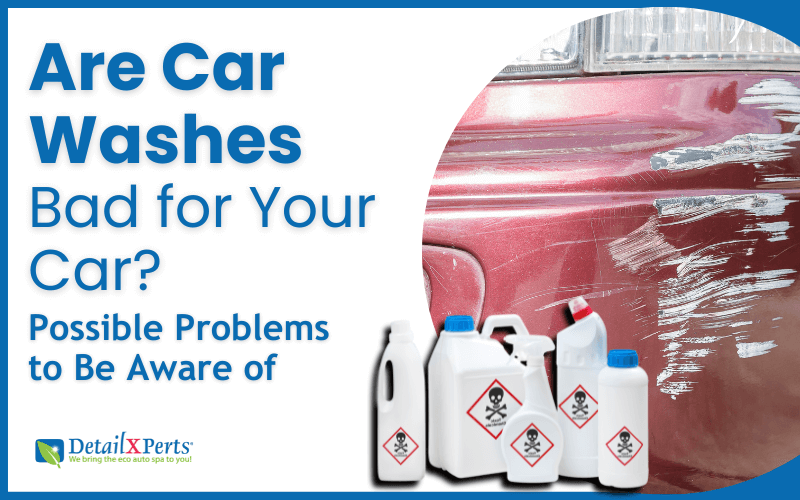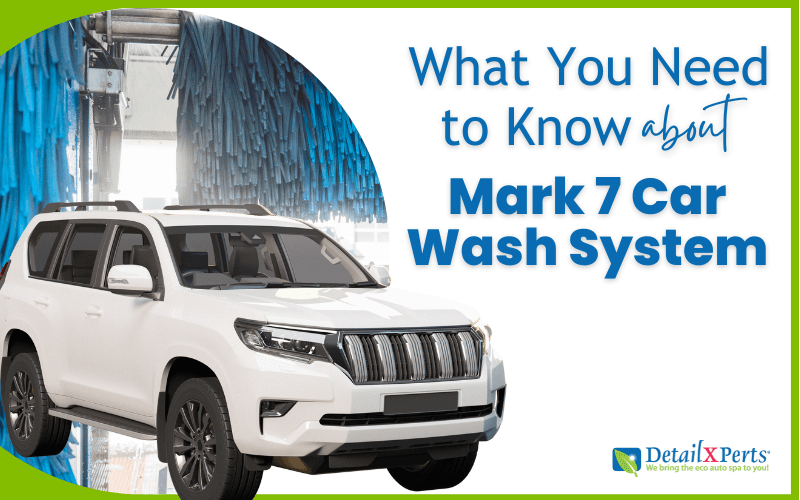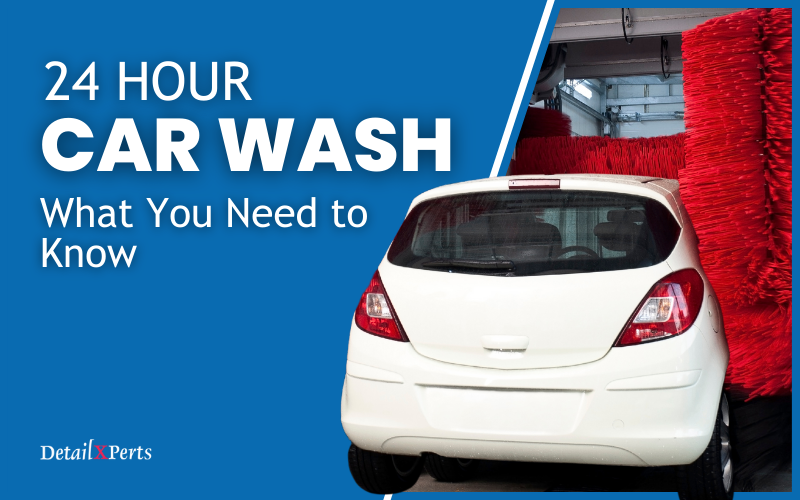Even though car wash equipment and technology are constantly improving, are car washes bad for your car? It’s only natural to ask this all-important question if you take pride in owning a clean and shiny vehicle. We address your concerns on this matter, such as do car washes damage paint, water spots, scratches, swirl marks, and other potential problems you should know about.
Types of Car Wash Problems
Car wash services can save you time and effort, but it’s important to be aware of the downsides. Here are some of the common problems associated with car washes.
Car Wash Scratches and Swirl Marks
Do car washes damage paint? Yes, in some cases, automatic car washes can leave scratches and swirl marks on your paintwork. High-speed rotating brushes used to scrub the dirt off your vehicle are rougher on paint and glass than wiping it down by hand using soft microfiber cloths.
You’ll also find that problems can arise in older car washes if the brushes are not well-maintained or regularly cleaned. Every vehicle that passes through the wash before you can leave behind dirt and grit particles in the bristles. This trapped dirt could end up marking your paint. The same can happen in a soft cloth car wash if the cloth or foam material is not kept super clean.
Paint Fading
Car wash paint damage includes fading and a dull appearance that may occur after repeated visits to an automatic car wash. Overexposure to harsh chemicals and abrasive cleaning tools can wear down or strip away the protective layers of wax and sealant, leading to faded paint. To avoid this problem, visit a reputable hand car wash where the detailer uses high-quality tools and products. Also, you should regularly apply a wax treatment to add a layer of protection.
Car Wash Damage From High Water Pressure
High-pressure water jets can potentially damage paint. Most of the time, this occurs if your vehicle is showing its age or has an existing problem. For example, if there is already a chip in the paint, the pressure from the water can make it worse.
Again, you may experience problems with an older vehicle if the seals show wear and tear. The force of high-pressure water can compromise seals around windows, doors, and sunroofs, potentially leading to leaks. So, if you are visiting a brushless car wash or laser car wash check your paintwork and seals first before using water jets to clean your car exterior.
Harsh Chemicals
Disadvantages of car wash services include the use of harsh chemicals. Acid-based cleaners or strong solvents that break down grease and dirt can be bad news for delicate finishes and protective wax layers.
Also, some car wash soaps and chemicals can leave a residue if not properly rinsed off, dulling the paint finish. If you’re visiting a waterless car wash, ask about the range of products used. Similarly, if it is a do it yourself car wash, choose gentle solutions or organic products to wash your car.
Interior Moisture and Mildew Smell
You might notice an unpleasant mildew smell after a visit to a car wash. This can happen after a full service car wash if the interior isn’t thoroughly dried. For example, using too much water to shampoo upholstery, floor mats, and carpets can create a damp environment where mildew growth thrives. If you notice a bad odor, see our tips on how to get mildew smell out of car.
Seek out reputable car washes that use efficient drying techniques to ensure there’s no moisture left behind. Alternatively, car interior detailing with steam is an excellent way to deep-clean your car interior without saturating seats and carpets.
Water Spots
Water spots form when water droplets dry on your car’s surface. For example, letting your car dry naturally after a visit to the car wash can cause water to evaporate unevenly, leaving spots. Also, many car washes use hard water, which contains high levels of minerals such as calcium and magnesium. These minerals can leave noticeable marks on your shiny paintwork when the water evaporates.
If you visit a self service car wash, ensure you thoroughly rinse the exterior to remove all soap. A final rinse with deionized water can also help prevent spots. And keep a good-quality microfiber towel in your car to remove any excess water.
Scrapes on Wheels and Tires
Car wash scratches and scrapes on wheels and tires can happen. Take care when driving into the facility. If the car wash tracks are not properly aligned or your car is not correctly positioned, the wheels can be scraped against the guide rails.
It’s also worth noting that harsh chemicals used in some drive through car washes can corrode the finish on wheels and may even degrade the rubber on tires. Acid-based cleaners tend to be the culprits in this situation.
You might feel happier using a touchless car wash that relies on high-pressure water and detergents rather than brushes. This frictionless method is less likely to mark your wheels and tires.
Seals and Trim Problems
Abrasive brushes in older car washes can scuff rubber seals and rubber trims. You must also be mindful that pressurized water jets can force water into seals and trim around doors, windows, and sunroofs.
Washing your car by hand using appropriate cleaning products and tools gives you more control and reduces the risk of damage to seals and trim. See our hand car wash equipment list.
However, if you decide to use automatic car washes, ensure the equipment appears in good condition. Avoid places with visibly worn or dirty brushes.
Marks on Windshield and Mirrors
It is a less common problem, but windshields and mirrors can get damaged in a car wash. For example, sand and dirt particles in fast-spinning brushes or cloths can scratch glass surfaces. Inspect your car before entering the tunnel or bay. If your side mirrors are already slightly loose or broken, they may end up in worse shape after contact with brushes or high-pressure water jets. Always fold in your mirrors before going through the car wash.
We recommend hand washing to protect your windshield and mirrors. See our tips on how to hand wash a car. You have more control over what tools and car wash supplies list you use, minimizing the risk of damage.
Inadequate Cleaning and Rinsing
Attention to detail is everything. So, look for car washes with well-maintained equipment, a range of wash options, and good reviews. Otherwise, your vehicle may receive substandard cleaning, creating car problems over time. For example:
- Missing out on removing road salt and dirt from your car’s undercarriage could cause rust and corrosion.
- A lack of interior cleaning options at a 24 hour car wash can lead to unpleasant odors and mildew growth inside your car.
- Express washes might not effectively remove dried-on bird droppings, bug splatter and tree sap. These substances can be acidic or sticky, causing permanent damage to the paint if not cleaned properly.
- Incomplete rinsing can leave soap and chemical residues on your vehicle’s surface. This can leave streaks on your paintwork or even spoil the clear coat over time.
- Improper techniques can also cause issues. For instance, auto detailers working with dirty rags or sponges could leave micro scratches on your car paintwork.
Broken Antennas
Common car wash damage claims include broken antennas. Brushes or cloth strips used in automated car washes can hit antennas fairly hard, causing them to bend, snap, or dislodge. High-pressure water can also put stress on antennas, particularly if they are not securely mounted. Even smaller fin antennas can snap off if hit with enough force.
The sensible thing to do is to retract or unscrew antennas before entering the car wash. Also, read the signage. Some places will have specific instructions regarding antennas. And if you ignore the advice, you will be liable for the repair costs if anything goes wrong.
Conclusion
Are car washes bad for your car? Yes, unfortunately, the risk of car wash damage is a concern. However, the extent of the problem depends on several factors, such as the age of your vehicle, the reputation of the car wash, the condition of the equipment, cleaning products and, of course, the type of car wash. For example, automatic friction car washes using brushes or cloths can trap dirt from previous washes and scratch your paint. Meanwhile, touchless car washes that use harsher chemicals to make up for the lack of scrubbing can strip away your paint finish over time.
So, it is important to choose your car wash wisely. Now you’re aware of the potential problems, you know what to look out for. Research car washes with good reviews and well-maintained equipment. If you want to steer clear of automatic car washes, reputable hand car washes are the answer. For example, DetailXPerts delivers an exceptional car wash experience with gentle steam cleaning technology and attention to detail. Your vehicle is in safe hands.








